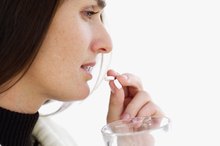Psychedelic Effects of Morning Glory Seeds
The seeds from morning glory plants can produce a psychedelic high much like taking LSD. Also called ololiugui by the 16th-century Indians, the seeds of the morning glory plant produce a hallucinogenic effect when ingested.
What Are They?
The morning glory plant is a twining perennial vine that is cultivated in many gardens.The plant bears clusters of blue to purplish flowers, and sometimes will produce white flowers. The seeds that are produced from the morning glory plant are brown or sometimes black in color. Once eaten, they are what produces a psychedelic high.
LSD-Like Properties
Calming Effects of Caffeine
Learn More
The active ingredient in morning glory seeds is an alkaloid called R-lysergic. The seeds also contain D-isolysergic acids 2. The acids are similar to ingredients found in LSD. The more seeds ingested, the greater the high.
- The active ingredient in morning glory seeds is an alkaloid called R-lysergic.
- The seeds also contain D-isolysergic acids 2.
Intense
Psychedelic or hallucinogenic substances produce a distortion in the brain of an actual stimulus. The drug does not create a new event. It basically expands on what is happening at that moment. In other words, if a good event is happening, then the person ingesting the seeds may experience a good trip. Although when negative things are going on, then the person may experience a "bad trip." The hallucinogenic agents affect the brain by interacting with the serotonin synapses. In sum, the drug will bring a heightened sense of what is happening.
- Psychedelic or hallucinogenic substances produce a distortion in the brain of an actual stimulus.
- Although when negative things are going on, then the person may experience a "bad trip.
- "
Synestheia
How Would Marijuana Addiction Affect a Family?
Learn More
Morning glory seeds will produce a heightened sense of awareness of colors, textures and sounds. A person can experience a sensory change from one sense to another that is called synesthesia. In other words, the drug user can hear colors or feel sounds. After having ingested morning glory seeds, they may take affect in about three hours.
- Morning glory seeds will produce a heightened sense of awareness of colors, textures and sounds.
- In other words, the drug user can hear colors or feel sounds.
Drug Effects
The drug-like experience that can occur while taking morning glory seeds includes having a diminished sense of reality. A person may do things he never did before due to an increased sense of suggestibility. Time is often slowed down while having a morning glory hallucinogenic experience. A person's ego will often intensify during a morning glory drug trip as well.
- The drug-like experience that can occur while taking morning glory seeds includes having a diminished sense of reality.
- A person's ego will often intensify during a morning glory drug trip as well.
Opposites Attract
A person ingesting morning glory seeds may have massive mood swings while on the drug.The seeds may make a person experience ecstatic feelings and become very blissful, and then the drug can cause one's mood to change in the opposite direction to become very miserable and down.
Warnings
Ingesting morning glory seeds isn't all bliss and great feelings. A person can become nauseated and vomit due to ingesting too many seeds. When a person experiences a "bad trip," he may need a friend to stay with him and help him get through the experience. A sense of major anxiety and panic can set in also. Sometimes a person may need to be taken to an emergency room because he can experience a psychotic episode from taking the seeds. At the emergency room, the drug user may need to be given a sedative or a tranquilizer to help him ease through the morning glory seeds' hallucinogenic effects.
- Ingesting morning glory seeds isn't all bliss and great feelings.
- Sometimes a person may need to be taken to an emergency room because he can experience a psychotic episode from taking the seeds.
Related Articles
References
Writer Bio
This article was written by the CareerTrend team, copy edited and fact checked through a multi-point auditing system, in efforts to ensure our readers only receive the best information. To submit your questions or ideas, or to simply learn more about CareerTrend, contact us [here](http://careertrend.com/about-us).









